|

by Dr. Tim Coles
New Dawn
Special Issue
Vol. 15
No 5 (Oct 2021)
from
NewDawnMagazine Website
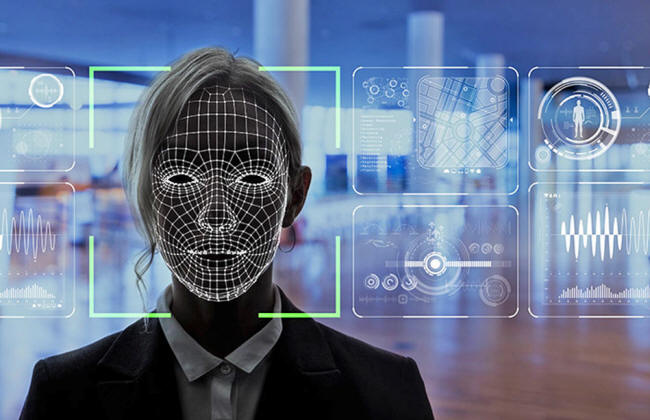
Founded in the aftermath of the first nucleus-splitting explosions
in the 1940s, the Bulletin of the Atomic Scientists is a panel of
nuclear and other specialists.
Every year, they estimate
how close we are to Armageddon...
They use a clock to
analogize the dangers.
In 1947, with the technology for global
destruction, but not the means to deliver it, the time was "7
minutes to midnight."
When in 1953 the Soviet Union exploded the hydrogen bomb, scientists
at the politicized Bulletin moved the symbolic clock hands to 2
minutes to midnight.
The creation of
intercontinental ballistic missiles (ICBMs) provided states with the
means of carrying weapons that could destroy the world.
Last year, the rabidly
anti-Donald Trump Bulletin moved the clock hands to the closest
they have ever been to midnight:
100 seconds...
[Editor's note: On 24
January 2023, the Bulletin of the Atomic Scientists moved its
"Doomsday Clock" forward to just 90 seconds to midnight.]
Much more likely than nuclear war is,
nuclear accident: computer
error, miscalculation, strategic escalation, etc...
If we survive possession of nuclear weapons and, crucially, the
means to deliver them,
what kind of future can humans in Western
societies expect over the next century?
In nearly 200 stories,
including shorts and novels, the late science-fiction novelist
Philip K. Dick (1928-82)
offered dozens of scenarios, some of which seem to be happening
today...

Philip K Dick with his wife Leslie (Tessa) Busby
(married between 1973-1977).
Photo
courtesy of Tessa Dick.
In the novel Dr Bloodmoney (1965), the eponymous character
accidentally destroys the world in an effort to counter Soviet and
Chinese nukes.
Survivors, like the
limbless Hoppy Harrington, rely on augmentation technologies to
function.
In real-life since the
1960s, the US Defense Advanced Research Projects Agency has been
using brain-machine interfaces to augment human capacities, such as
wiring armless veterans to machines to enable them to control
robotic limbs with their thoughts.
This technology will be
used to design next-generation killers that can operate in harsh
environments, including irradiated zones and deep space...
SYNTHETIC
REALITIES
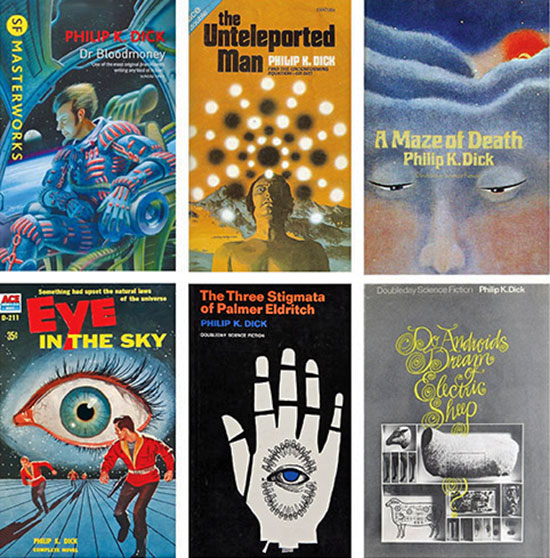
Selection of recent and first edition
paperback and hardback editions
of
Philip K Dick's works.
What is "real"?
For millennia,
philosophers and theologians have grappled with this issue.
In his
novel Eye in the Sky (1957), Dick writes about a
Multiverse in which
half a dozen people are trapped as projections of their subjective
unconscious.
The novel explores themes
of solipsism and the limits of conscious knowledge, asking how much
or little we know about ourselves.
Similar themes were
explored by the psychoanalyst Carl Jung, whose work has been
compared to Dick's explorations of human motivations.
Both dealt
with end-time themes and humanity's (in)ability to adjust to
civilisational changes...
Technology has augmented representation to the point where it is
hard to distinguish that which is "real" from that which is modified
or complete fiction.
According to the UK
Ministry of Defence, out to the year 2036,
"simulation and
representatives will have a significant and widespread impact on
the future and will become an increasingly powerful tool to aid
policy and decision-makers.
It will also blur the line between
illusion and reality".
Deepfakes pose national
security challenges, as videos of leaders in compromising positions
can be invented from whole cloth with 1s and 0s and targeted at
na´ve audiences to influence their opinions.
Holographic projections
could fool observers into thinking they've seen something tangible
which actually consists of pure light. Such technologies can be
marketed at pop concerts that "resurrect" dead singers, just as much
as they can for military operations.
Some philosophers have abandoned the word "reality" when speaking in
generalities because the denotation is subjective and vague.
Yet, we all believe that
we are present in a physical world and that we are conscious:
if
not, we'd stop eating and drinking because food and hunger, etc.,
would not be "real"...
This, too, leads to more
intellectual problems because physics suggests that what is
"physical" is merely potential in quantum fields.
Consciousness, too, is
considered a "hard problem" by neuroscientists and psychologists
because there is no scientific framework for investigating
consciousness, just aspects of what we call consciousness.
In The Unteleported Man (1964, later Lies, Inc. 1966), Dick
tells a tale of commercialized, physical teleportation to an
Earth-like utopia, which turns out to be an advertising ploy to hook
unhappy colonists.
In "reality," the US
Defense Department recorded the teleportation of light particles
over small distances in the mid-2000s. The results do not appear to
have been widely reported, if at all.
Today, Chinese scientists
are unwittingly feeding the New Cold War propaganda machine in the
West with their own, much better-publicized teleportation
experiments.
Using
virtual reality (VR),
like the Oculus corporation's headset, Facebook's Reality Labs is
trying to create a "metaverse" of augmented reality in which users
can be digitally teleported into another's VR space.
With reality under question, some philosophers advocate giving up
intellectual searches and favoring spiritual ones:
to de-condition
oneself from sensory experience and just "be."
But here we get back to
the circular argument:
what is "just being"?
Dick suggests that such
questions can never be answered because of the limits of the human
mind and the structure of that which we call reality.
In A Maze of Death
(1970), Dick's characters talk of being,
"prisoners of our own
preconceptions and expectations."
Dick's work was Gnostic:
a broad term for
those who believe that existence is a kind of veneer of a
deeper, more fulfilling experience kept from us by invisible
forces.
"Reality," for Gnostics
like Dick, is an artificial construct:
a kind of con-trick at best
and prison at worst, designed and sustained by powers that cannot
ordinarily be detected or defeated.
Dick's novels concerned
themselves with antiheroes who found themselves in situations in
which the "real" them was indistinguishable from the fake them and
real or fake others.
Do Androids Dream of
Electric Sheep? (1968), for instance, adapted into the movie Blade
Runner (1982), concerns human life in a society permeated with "replicants"
who, for all intents and purposes, could be human.
Although physically
human-looking robots are a long way off, chatbots already trick
humans into thinking they are real.
The first successful bot
was "Eugene Goostman," which tricked a significant number of
participants into believing it was a human.
Untold numbers of troll
bots post fake reviews on Amazon.
From this, we can ask:
if "reality" is
unreal in the sense of it being someone or something else's
construct and that there is some kind of "true reality," how
much of you is "real" and how much of you is the result of
unchecked, unquestioned, and unchallenged conditioning...?
The conditioning can be
from nature (limited consciousness, sensory conditioning), from
other people (who tell you what to do and to believe from infancy),
and your own internalized conditioning that perpetuates the tricks
and lies.
Anthropologists and sociologists call personality a social
construct. In other words, if you developed your mind and
personality in a cultural vacuum - no religion, no politics - how
different would you be?
But without social
inputs, including those of culture, the infant brain does not
develop.
So, we are back in the
trap:
You need input to
develop but, are you the sum of those inputs or do you have
unique qualities?
Is the uniqueness
your true self?
THE POLITICS
OF THE TRUE SELF
One perennial philosophy is:
know yourself...!
But can the self be known
in the contradictory circumstances in which we find ourselves?
Corporations that seek to
maximize profit and politicians who seek to control the public take
advantage of our lack of self-knowledge.
They use,
education,
culture, propaganda, and fear to construct artificial personalities,
turning us into a kind of "replicant"...
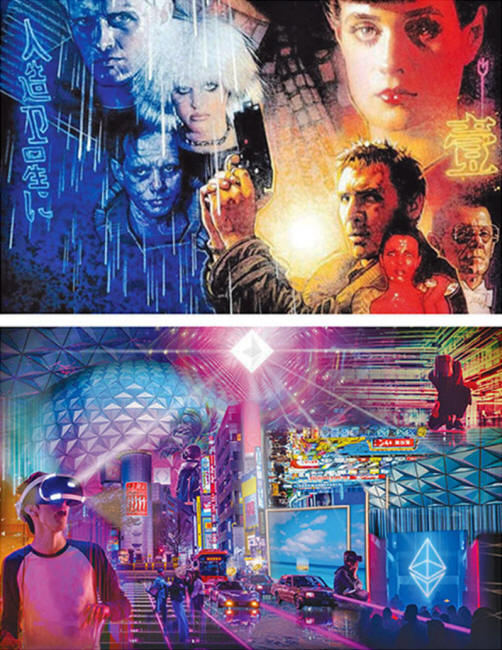
Top:
Philip K Dick's 1968 book Do Androids Dream of Electric Sheep?
was adapted into the 1982 movie Blade Runner.
The theme concerns human life in a society permeated with "replicants"
who, for all intents and purposes, could be human.
Above:
Promotion graphic for Facebook's "metaverse" - an augmented
reality
in which users digitally teleport into virtual reality space.
Spend enough time in these manipulated virtual spaces
and people soon won't tell the difference between real humans
and the humanoid robots under development right now.
In the film The Adjustment Bureau (2011), based on Dick's short
story Adjustment Team (1954), non-human interventionists interfere
in the life of an upcoming politician.
At first, the audience
thinks that these beings are political rivals, but (spoiler alert)
they are nudging him away from his soul mate to pursue the higher
goal of self-sacrifice for the greater social good.
In today's online culture, you are the product...
The World Wide Web
spins its threads in which to trap the surfer...
Instead of doing work for
the greater good,
the surfer is manipulated by myriad institutions
and individuals to follow certain paths beneficial only to the
manipulators.
Brokers and ad agencies
steal your data. We live in a performance, for-profit culture in
which the self can be commodified in online spheres.
One of Dick's famous quotes is:
"There will come a
time when it isn't 'They're spying on me through my phone'
anymore.
Eventually, it will
be 'My phone is spying on me'."
Today, the
phone is life for millions of people...
It allows us to access
emails, the news, take photos, purchase goods and services, surf the
net, check our health status, and even prove vaccination.
Dependence
on technology gives intelligence agencies and Big Data endless
opportunities to control and manipulate.
In Dick's day, spy
agencies would listen in through the phone, but today the technology
inside the phone automatically passes data to the given agency.
Cell towers
triangulate the user's geolocations, even when the phone is
switched off.
The International
Mobile Equipment Identity is a 15-digit number that identifies
phones on a network.
Phones also store
user IP addresses.
Apps can also spy on
users.
Angry Birds,
CamScanner, DoorDash, Grindr, Ring Doorbell, Tinder, Weather
apps, WhatsApp, and Zombie Mod, have all been found to be Trojan
horses for the US National Security Agency (NSA) and/or covertly
passing user data to brokers.
Caveni Digital Solutions
founder Raffi Jafari says:
"If you are looking
for apps to delete to protect your information, the absolute
worst culprit is
Facebook," as well as its WhatsApp, Messenger,
and Instagram.
"The sheer scale of
their data collection is staggering, and it is often more
intrusive than companies like Google."
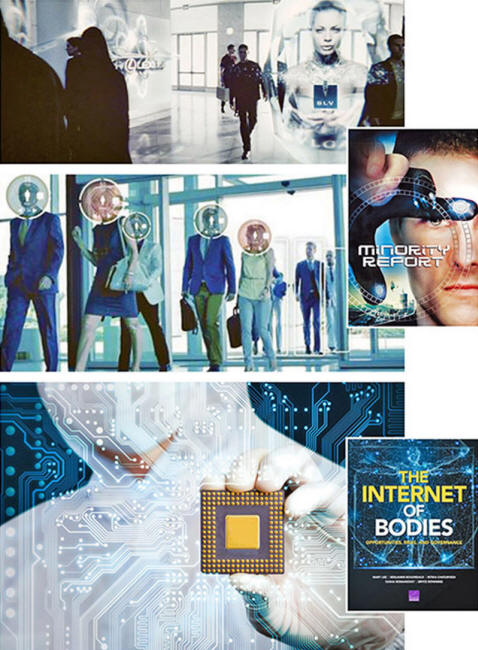
Top:
Based
on Dick's short story,
the
2002 movie Minority Report predicted a society
saturated with advertising in which your personal data
is
poached to deliver targeted ads in manufactured realities.
Centre:
Facial
recognition systems are under development today
for
tracking, surveillance and data collection.
Above:
RAND Corporation report on integrating
the
Internet-of-Bodies into the Internet-of Things.
In the movie Minority Report (2002), based on Dick's short
story, society is saturated with advertising:
from interactive ads
on cereal packets to voice-to-skull technology that beams
commercials into the heads of people passing by...
Today, real-life adverts
are targeted at the users, but data to refine targeted ads is sucked
out of "personal" devices, creating a feedback loop.
"[T]oday we live in a
society in which spurious realities are manufactured by the
media, by governments, by big corporations, by religious groups,
political groups - and the electronic hardware exists by which
to deliver these pseudo-worlds right into the heads of the
reader, the viewer, the listener."
Dick said this in 1978.
"I ask, in my
writing, What is real?
Because increasingly
we are bombarded with pseudo-realities manufactured by very
sophisticated people using very sophisticated electronic
mechanisms.
I do not distrust
their motives; I distrust their power."
Whatever is "real" about
the human is being gathered and uploaded into myriad VR programs
that benefit our controllers but, crucially, make us superficially
happy in the process so that we do not rebel, like the contented
slave of Aldous Huxley's
Brave New World (1932).
The military-industrial
complex is trying to aestheticize the technologies of control to
make them appealing to users...
One designer worked with
the RAND Corporation on the concept of "Internet of Bodies," a
biological step up the ladder of the "Internet of Things."
In this new age of
bioconnectivity, Bluetooth-connected apps tell parents when
their babies have shat.
Artificial pancreases
send real-time data on glucose levels to algorithms that
automate insulin dosing.
Wearable Attention
Monitors use brain activity to track inattentiveness during
scenarios like driving.
Digital pills
transmit biodata on reactions to ingested tablets.
In The Three Stigmata
of Palmer Eldritch (1965), Dick wrote about the blend of VR and
genetic enhancement.
In our real world, the "real" is being modified
at the genetic level to create new physical biorealities:
from engineered
babies to enhanced food, from gene editing to mRNA vaccines...
But who benefits?
GMO food is sold to
international consumers as a cure for global hunger, while domestic
consumers are often not told that modified products are in their
foods.
The human body has receptor cells (7 and 8) that shut down host cell
protein synthesis, thereby preventing the use of certain materials
as vaccine vectors.
Modified messenger RNA
enables the vector to escape detection, triggering the immune system
to help the body fight similar infection:
in theory, mRNA
research developed into the 2010s, some of it with funding from
the US Defense Advanced Research Projects Agency.
But the untested (on
humans) technology had no chance of being mass-marketed until
COVID
came along.
Pfizer, BioNTech, and
Moderna developed
mRNA vaccines accordingly.
Transcendence &
Control
Dick also prophesied that,
"[c]omputer use by
ordinary citizens... will transform the public from 'passive
viewers of TV' into 'mentally alert, highly trained
information-processing experts'."
But the price of mental
alertness is addiction to screens...
It is also losing our
physical selves in a digital realm. The human is not merely a data
processor; humans themselves become data that unseen powers buy,
sell, manipulate, and use to create further synthetic realities.
With so much online
influence in the form of peer pressure, propaganda, targeted
marketing, biosurveillance, and non-physical interaction, what it
means to be human is challenged in the constant environment of
Internet-of-Things.
What it means to be
physically human is also challenged as unaccountable corporations
tinker with food, vaccines, and even the cells that produce humans.
Dick's characters, and
indeed Dick himself, struggled to navigate this ever-shrinking
minefield.
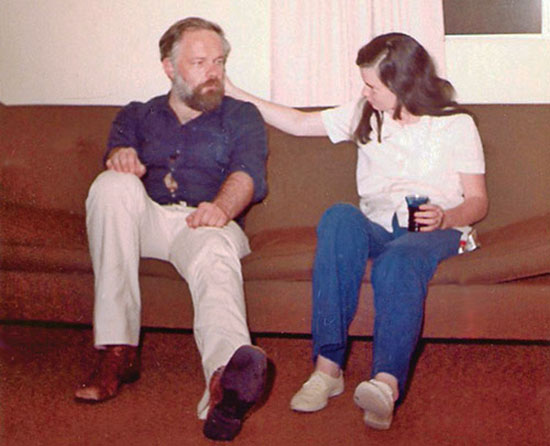
Philip K Dick in a moment of reflection,
consoled by his fifth wife Tessa.
Photo
courtesy of Tessa Dick.
Perhaps more important than outer, modified constructs is the inner
world inhabited by the characters.
Our techno overlords have
not yet mastered how the inner self projects reality externally and
how the external world conditions the individual to internalize
their control.
The latter fascinated
Gnostics like Dick, who felt the glimmer of transcendence in the
darkness of matter and
synthetic reality...
Footnotes
-
-
-
-
Konrad
Szocik and Martin Braddock (2019) "Why Human Enhancement is
Necessary for Successful Human Deep-space Missions,"
New
Bioethics, 25(4): 295-317
-
Stuart
Douglas (2018) The Apocalypse of the Reluctant Gnostics:
Carl G. Jung and Philip K. Dick, Routledge
-
-
Congressional Research
Service, "Deep Fakes and National Security," 26 August 2020,
apps.dtic.mil/sti/citations/AD1117081
-
Tomoko Sano, "Holography: The
Next Disruptive Technology," Army Research Laboratory, April
2017, ARL-TR-8007,
apps.dtic.mil/sti/pdfs/AD1033176.pdf
-
For instance, Noam Chomsky
(2003) Chomsky on Chomsky: Language, Mind, and Freedom:
The Stony Brook Interviews,
www.academia.edu/35999655/Chomsky_Interview.docx
-
D.M. Cabaret et al. (2021)
"Elementary Particles: What are they? Substances, elements
and primary matter," Arxiv,
arxiv.org/pdf/2103.05522.pdf
-
David J.
Chalmers (1996) The Conscious Mind: In Search of a
Fundamental Theory, Oxford University Press
-
Eric W. Davis, "Teleportation
Physics Study," Air Force Research Laboratory,
AFRL-PR-ED-TR-2003-0034, August 2004,
sgp.fas.org/eprint/teleport.pdf
-
-
-
-
Quoted in
Lejla Kucukalic (2009) Philip K. Dick: Canonical Writer
of the Digital Age, Routledge, p. 115
-
Lorenzo
DiTommaso (2001) "Gnosticism and Dualism in the Early
Fiction of Philip K. Dick," Science Fiction Studies,
28(1): 49-65
-
Karen L.
King (2003) What Is Gnosticism?, Harvard University
Press
-
Doug Aamoth, "Interview with
Eugene Goostman, the Fake Kid Who Passed the Turing Test,"
TIME, 9 June 2014,
time.com/2847900/eugene-goostman-turing-test
-
-
Mitchell S.
Green (2018) Know Thyself The Value and Limits of
Self-Knowledge, Routledge.
-
Shauna L.
Shames and Amy L. Atchison (2019) Survive and Resist:
The Definitive Guide to Dystopian Politics, Columbia
University Press, eBook
-
-
-
-
Quoted in Leah Campbell, "If
These Apps Are Still on Your Phone, Someone May Be Spying on
You," Reader's Digest, 16 June 2021,
www.rd.com/list/phone-apps-spying-on-you
-
Philip K.
Dick (1995) The Shifting Realities of Philip K. Dick:
Selected Literary and Philosophical Writings, Pantheon
Books, p. 262
-
-
Kenneth R.
Chien, Lior Zangi and Kathy O. Lui (2015) "Synthetic
Chemically Modified mRNA (modRNA): Toward a New Technology
Platform for Cardiovascular Biology and Medicine," Cold
Spring Harbor Perspectives in Medicine, 5(1): a014035
-
-
Ariadne A.
Nichol (2020) "Potential Implications of Testing an
Experimental mRNA-Based Vaccine During an Emerging
Infectious Disease Pandemic," The American Journal of
Bioethics, 20(7): W1-W3
-
Shifting
Realities, op. cit., p. 102
|







